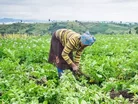Kenyan insurtech raises $6m to insure African farmers

The Kenyan insurtech startup Pula has closed a Series A investment round of $6m with the goal of providing digital and agricultural insurance to African farmers.
Pan-African early-stage venture capital firm, TLcom Capital, led the round, along with nonprofit Women’s World Banking.
The funding comes after Pula raised $1m in seed investment in 2018 from Rocher Participations, Accion Venture Lab, Omidyar Network and several angel investors.
Founded in 2015 by Rose Goslinga and Thomas Njeru, Pula provides agricultural insurance and digital products to assist smallholder farmers to manage climate risks, enhance farming practices and improve their incomes in the long-term.
According to a recent report by Mercy Corps, smallholding farmers produce up to 80% of the food supply in Africa and Asia. However, they face a 90% chance of crop loss due to environmental factors beyond their control.
Most of them don’t have crop insurance and bad harvests result in their loss of income which doesn't get replenished until the following season.
Goals
Pula is driven by the goals of its founders to assist and improve the lives of African farmers. “When Thomas and I launched Pula in 2015, we had one goal in mind: to build and deliver scalable insurance solutions for Africa’s 700 million smallholder farmers,” Goslinga recently told TechCrunch.
“With our latest funding, now is the time to break into new ground. In our five years since launching, we’ve built strong traction for our products. However, the fact remains that across Africa and other emerging markets, there are still millions of smallholder farmers with risks to their livelihoods that have not been covered.”
Farming values
Although agriculture insurance in the US and Europe holds an average premium of $1000, in Africa, the amount is just $4. However, though Africa represents less than 1% of the world’s premium value, the continent is home to 17% of the world’s farmable land.
Traditional farming methods have led to a gap in calculating insurance values and many smallholders cannot afford insurance company visits. This results in many of them operating without insurance cover and then falling foul of natural risks such as floods, droughts and pestilence.
According to reports, the latest funding round will enable Pula to grow operations in its existing African markets. So far, the startup has insured an estimated 4.3m farmers in Ghana, Nigeria, Tanzania, Ethiopia, Madagascar, Rwanda, Uganda, Mozambique, Zambia, and Senegal.
Technology solutions
According to its founders, Pula is offering solutions through using the latest technology and data to manage its coverage plans. The company’s Area Yield Index Insurance product uses machine learning (ML) crop research and collected data on weather and farming crisis, to assess risk and create the appropriate cover.
Signing up customers has been challenging, according to Goslinga, who said optimism bias affects small-scale farmers. She explained, “Some think a climate disaster wouldn’t hit their farms for a particular season; hence, they don’t ask for insurance initially. But if they witness any of these climate risks during the season, they would want to get insurance, which is counterproductive to Pula.”
As a result, Pula has collaborated with incumbent banks. Farmers who take loans are then obligated to have an insurance policy through Pula. The startup is also working closely with local governments and agricultural companies and has over 50 insurance and reinsurance partners.
So far, Pula has agreements with the World Food Programme and Central Bank of Nigeria, the Zambian and Kenyan governments, the One Acre Fund, Apollo Agriculture and agribusiness players such as Flour Mills and Export Trading Group.
Goslinga said, “The unit economics doesn’t work for us to work with farmers directly. But with banks, we know they provide loans to farmers with much better margins to pay for insurance. Also, we work together with government subsidy programs since they’re also interested in protecting their farmers.”
Featured Articles
West Virginia insurer FMIWV adopts artificial intelligence to enhance property underwriting accuracy and reduce costs using data-driven approach
Veteran insurance executive to take helm at Lloyds of London as it seeks to build on recent financial turnaround
Clearwater has expanded its capabilities through the strategic purchase of Beacon, aiming to unify front-to-back office processes for institutional client

